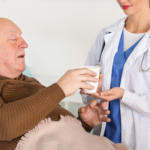 When most people think of Parkinson’s Disease (PD), the first symptom to come to mind are physical tremors and other movement symptoms. However, most people with Parkinson’s experience a wide range of non-motor symptoms that can often be more disruptive to their daily lives. Several of the most common non-motor complaints are associated with sleep issues. We all need sleep for our bodies to revitalize and repair as well as for productive days. For people with PD, achieving regular, healthy sleep and staying alert the next day are among the many problems associated with the disease.
When most people think of Parkinson’s Disease (PD), the first symptom to come to mind are physical tremors and other movement symptoms. However, most people with Parkinson’s experience a wide range of non-motor symptoms that can often be more disruptive to their daily lives. Several of the most common non-motor complaints are associated with sleep issues. We all need sleep for our bodies to revitalize and repair as well as for productive days. For people with PD, achieving regular, healthy sleep and staying alert the next day are among the many problems associated with the disease.
PhotoPharmics is finalizing plans for a clinical trial of our FDA Breakthrough therapeutic device, Celeste®, aiming to relieve non-motor symptoms for people with PD from specialized phototherapy.
Over 75 percent of people with PD report these issues. These can come from a variety of sources. Parkinson’s itself can cause sleep disruptions and contribute to daytime fatigue, while many PD medications can often aggravate these problems. This lack of restorative sleep can affect patients’ quality of life and also their bodies’ ability to manage PD. Daytime fatigue further impedes personal productivity and reduce social interactions.
The following is a list from Parkinsons.org of the most common sleep issues people with Parkinson’s face
- Difficulty falling and staying asleep
- Excessive daytime sleepiness
- Talking or yelling out while asleep
- Vivid dreaming
- Leg movements, jerking, cramping (restless leg syndrome)
- Difficulty turning over in bed
- Waking up to go to the bathroom
Experts advocate several things that to help people with PD get a better night’s sleep. First, make your sleeping schedule consistent. Plan to get around eight hours of sleep a night. Go to bed around the same time each night and wake up (or get out of bed) at similar times in the morning. It can also help to have a bedtime routine (drinking water, brushing teeth, etc.) to help prepare your body for sleep.
Second, night-time sleep quality can be affected by what you do during the day. Experts recommend daily exercise and spending time outside if possible. While this may be difficult for some, exposure to sunlight is also recommended. PhotoPharmics is finalizing plans for a pivotal clinical trial of our FDA Breakthrough therapeutic device, Celeste®. The aim of this trial is to confirm the high levels of relief for non-motor symptoms for people with PD from specialized phototherapy.
To learn more and receive updates about this clinical trial or other details about PhotoPharmics, visit photopharmics.com.





